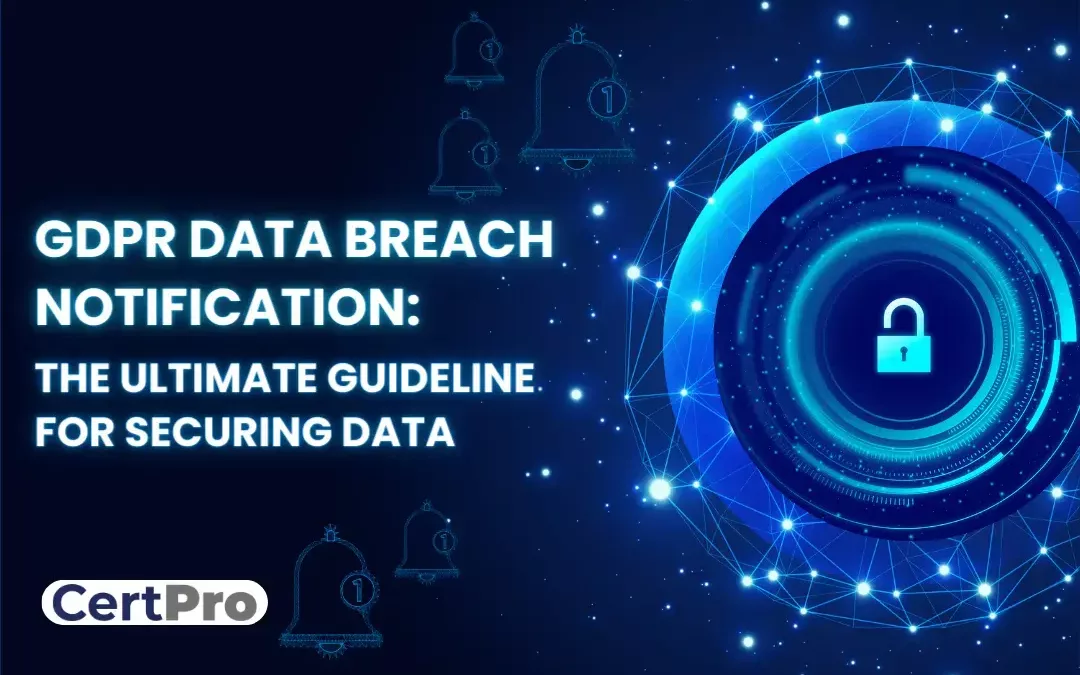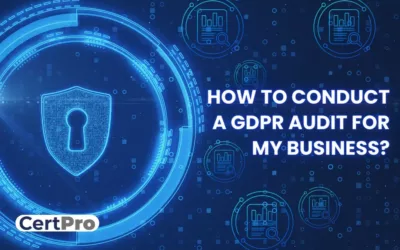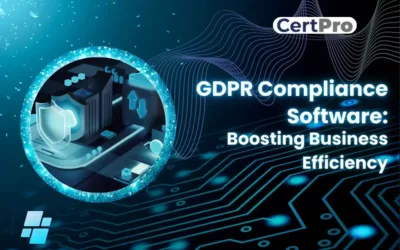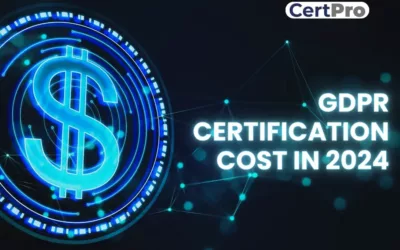Modern businesses require incorporating personal data protection strategies to ensure customer satisfaction and business growth. In this respect, the European Union’s General Data Protection Regulation (GDPR) sets strict standards for maintaining data security. However, in certain situations, security breaches risk the client’s data. Therefore, GDPR data breach notification comes in, ensuring customer protection. The whole scenario works so that GDPR informs the people and the proper authorities about breaches and asks for the quick fixing of the flaws. Thus, it promotes transparency and strengthens trust. Thus, the GDPR data breach notification signifies the importance of responsibility and accountability. The GDPR stresses the importance of taking responsibility during data breaches, which makes the business safer and more secure for stakeholders.
This blog will discuss GDPR data breach notification requirements and their importance. Furthermore, it will then discuss what rules they have, how to do them well, and why they suit businesses and customers. Come along as we learn more about how GDPR helps keep things transparent, fair, and safe in this digital world.
ABOUT GDPR DATA BREACH NOTIFICATION
The GDPR’s data breach notification is essential for data security. Therefore, the requirement is outlined in the General Data Protection Regulation (GDPR). Hence, data breaches could badly affect the confidentiality and integrity of personal data. Hence, GDPR data breach notification must promptly notify the relevant supervisory authority and affected individuals to take necessary action. Consequently, this notification must include specific information about the breach, including the nature and data types concerned. However, the system allows the affected individuals to take precautions to avoid potential harm. It also helps the authorities and ensures companies are following the data security rules. It helps maintain customer trust while avoiding significant penalties for noncompliance.
WHEN TO NOTIFY THE BREACH?
According to the GDPR, if personal data is breached, the data controller must immediately notify the appropriate supervisory authority. Thus, the breach must be reported within 72 hours of becoming aware of it. Furthermore, if the breach is expected to pose a significant risk to individuals’ rights and freedoms, the data controller must notify the affected data subjects immediately.
WHO TO NOTIFY ABOUT THE BREACH?
During any data breach incident, the GDPR data breach notification informs the data controller, notifies the relevant supervisory authority, and communicates directly with affected individuals. Thus, the whole incident happens if the breach poses a significant risk to the rights and freedoms of the data holders. Furthermore, if the data processor discovers a violation, they must immediately notify the controller. Hence, ensures that breaches are addressed promptly and data protection standards are upheld.
ABOUT DATA BREACHES UNDER GDPR
Data breaches under GDPR refer to when someone obtains personal information without permission. In addition, this could be things like names, emails, or money details. It’s a serious issue because it can affect people by stealing their identities or money. Furthermore, it harms businesses and causes them to lose revenue. If data breaches under GDPR occur, the organization must inform the authorities within 3 days if it won’t harm anyone. On the other hand if it could harm people, they have to inform them early. To comply with GDPR, organizations need to ensure personal data is safe and try to prevent breaches from happening. If they don’t follow these rules, they can be fined a lot of money. GDPR wants to protect people’s privacy and ensure that companies are responsible for data.
WHAT TO INCLUDE IN THE NOTIFICATION?
The notification for a GDPR data breach should include the following essential information:
- Description of the Breach: Explain the nature of the breach. Including details on the categories and approximate number of individuals (data subjects) affected. As well as the categories and approximate number of personal data records compromised.
- Contact Details: Provide the name and contact information of the data protection officer. Otherwise, another person should be contacted for more information about the breach.
- Potential Consequences: Describe what might happen to the people affected by the breach. This includes things like identity theft, financial loss, or reputational damage.
- Remedial Actions: Describe the measures already taken or proposed to address the breach. Hence, it involves reducing its impact, protecting the data, and preventing breaches from happening again.
Adding these key details to the notification helps comply with the GDPR guidelines and ensures transparency and accountability when handling data breaches.
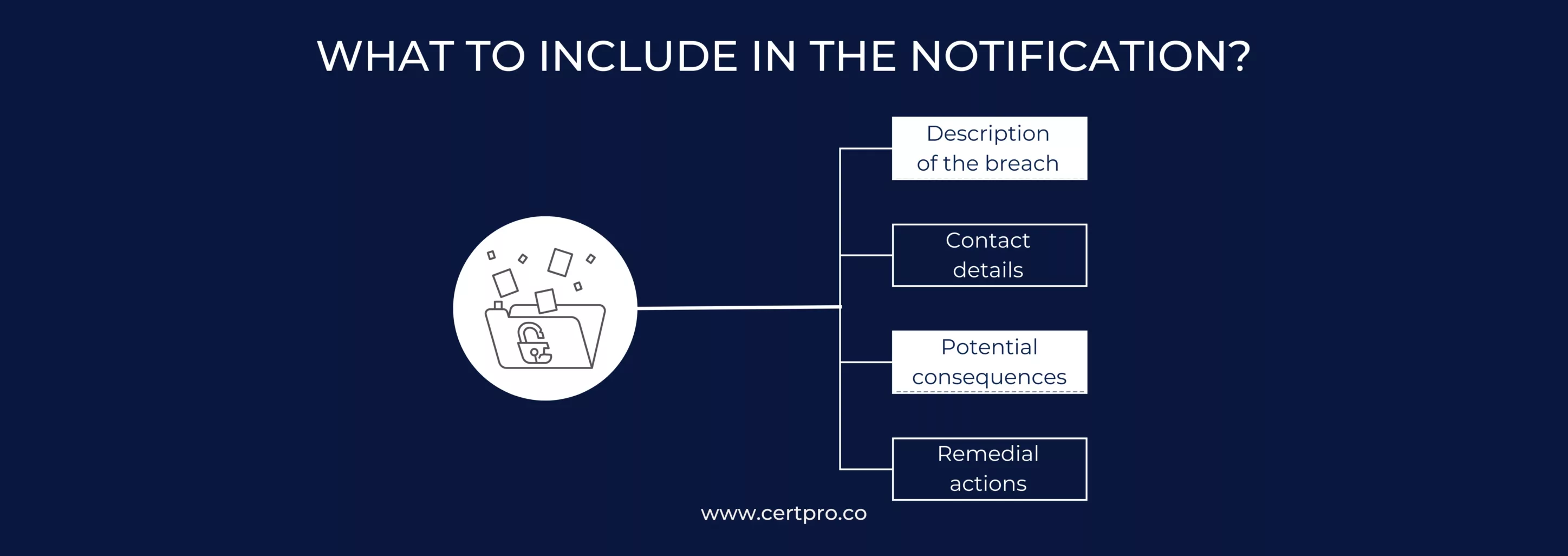
BEST PRACTICES FOR GDPR DATA BREACH NOTIFICATION
The GDPR data breach notification requirements play an important role in data security. However, more than simply notifying authorities and affected individuals is needed. Here are some best practices to ensure an effective and compliant response:
1. Effective Response: It is extremely important to respond quickly and effectively to data breaches. Firstly, ensure you have reasonable security measures to spot breaches early and check the problem’s size. Secondly, tell the right authorities about it within 72 hours to avoid trouble and maintain trust. Lastly, when you tell people about the breach, use simple language to explain what happened, what data was affected, and what could happen next. Furthermore, following these steps helps organizations handle data breaches better and keep things transparent and fair for everyone.
2. Focus on Transparency and Customer Service: Transparency and customer care are fundamental when facing data breaches. First, let the affected person know about the breach. Then, advise them on clear steps to help lower any risks. Therefore, suggestions include changing passwords or keeping a close watch on financial accounts. Secondly, maintaining open communication is essential. Keep establishing a dedicated point of contact and keep talking to them. Ensure there’s someone they can easily talk to if they have questions about the breach. By being transparent and supporting customers, companies can effectively manage data breaches. It’s paved the way to showcase that they care about their customers and are doing the right thing.
3. Being Prepared: Being ready is super essential to stop data problems. To get ready, do a few things. Additionally, make a good plan for when there’s a data problem. This plan should explain finding, looking into, and fixing problems. Also, it should say who does what and how to talk about it. Therefore, keep a list of all the personal data you have. This helps to see how bad a problem is and find who’s been affected. Lastly, make sure everyone knows how to keep data safe. Teach them about good habits and what to do if something seems wrong. Doing these things helps us be ready and handle data problems better.
4. Continuous Improvement: Continuous improvement is essential for maintaining strong data security measures. Additionally, it’s important to learn from any breaches by conducting a thorough review to identify weaknesses and enhance data security. This means updating the plan for responding to violations so it works even better next time. Also, regularly testing the plan ensures it works well and can be improved. By consistently assessing data security measures, organizations can protect against breaches.
5. Employee Training: It is really important to train employees on GDPR Compliance. Hence, they need to understand their responsibilities, especially regarding GDPR breach reporting. This means knowing what a breach is, how to find one, and what to include in a report. Thus, the training should match your company’s needs and use examples to show how GDPR works in real life. Good training helps employees do their jobs better.
6. Regular Reviewing: Keeping up with GDPR rules is important and requires ongoing effort. You should regularly review and update your data protection policies and procedures. This includes reviewing your data breach response plan to ensure it still follows the latest methods. Also, make sure to train your employees regularly. This helps them learn more about new technologies and updates in how your organization works.
BENEFITS OF DATA BREACH NOTIFICATION
Here’s a breakdown of the critical advantages for both organizations and individuals:
1. Transparency: Transparency means being honest with customers. If something goes wrong, the company tells customers right away. This helps customers protect themselves from harm. When companies are transparent, customers feel they can trust them. Therefore, it helps in building relationship between the company and its customers.
2. Accountability: This regulation ensures that companies are accountable for safeguarding data. However, knowing they must report any issues, they prioritize enhancing security measures. This prompts them to invest more in strengthening their security protocols, making data protection their main focus.
3. Early Warning: Prompt notifications help people act quickly to protect themselves from the breach. Being informed early gives them the power to defend themselves and their data. This proactive approach helps reduce the harmful effects and solve any problems from the breach faster.
4. Improved Security: Data Protection Authorities (DPAs) can examine reported breaches to find weaknesses, enabling them to create better security methods. This boosts data security standards overall, ensuring better protection for personal information.
In short, GDPR data breach notification is essential for keeping data safe online. When a breach happens, GDPR makes sure companies inform respected authorities quickly. This helps keep things clear, makes companies responsible, and stops problems early. When companies inform people and authorities rapidly, it shows they’re serious about protecting data. It helps authorities make things better for everyone’s security. Following GDPR rules not only stops fines but also builds trust with customers. By showing they care about data. GDPR data breach notification isn’t just a rule; it’s about doing the right thing with data in today’s world.
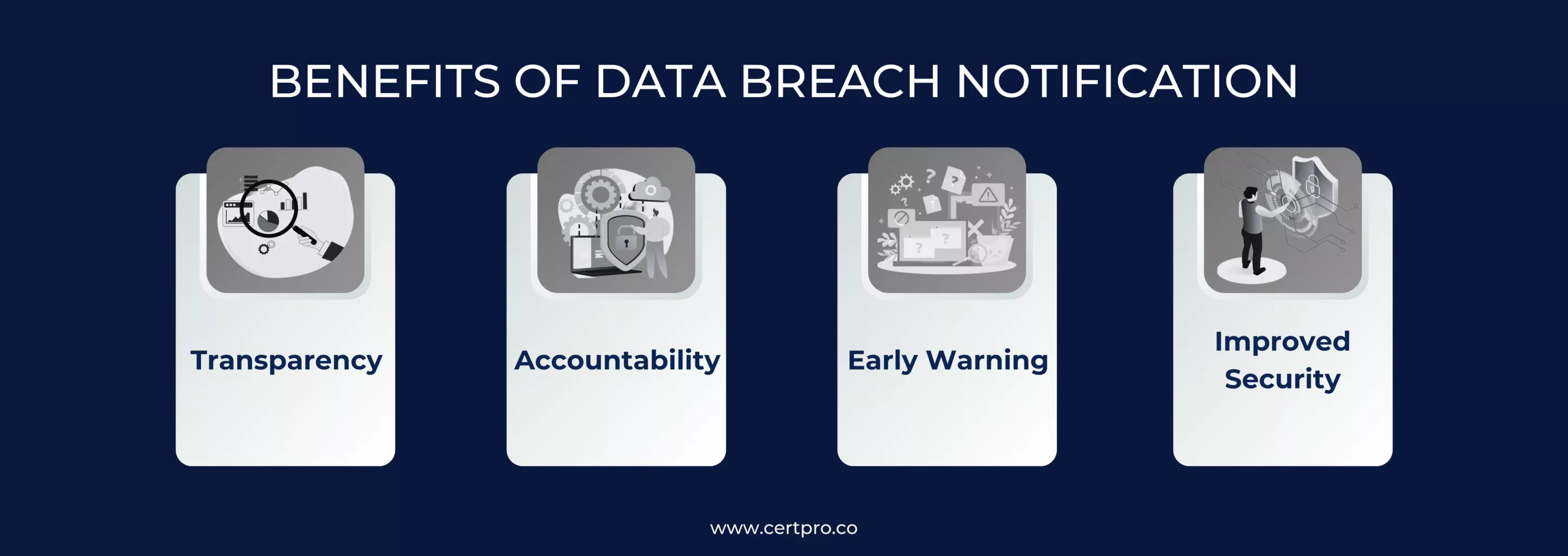
FAQ
What are the three main goals of the GDPR data breach notification?
- Ensure homogenous protection of sensitive data.
- Simplify the whole process of data handling with data security.
- Increase the accountability of the service providers
Why is GDPR data breach notification vital for companies?
It is vital to secure the data, as data breaches can cause financial and reputational losses for your organization. They can also result in huge penalties and downgrade your business capabilities.
What are the 3 types of personal data breaches?
- Unauthorized personal information access by existing employees
- Employees accessing the data after leaving the organization
- Sensitive information sent to someone by mistake.
What is the maximum fine for a GDPR breach?
How can I ensure my company complies with GDPR data breach notification requirements?

About the Author
SHREYAS SHASTHA DRUPADHA
Shreyas Shastha Drupadha, a Senior Business Consultant. Serving as an ISO 27001 Lead Auditor, Shreyas ensures the establishment of robust information security management systems. His expertise also encompasses GDPR, HIPAA, CCPA, and PIPEDA implementation.
HOW TO CONDUCT A GDPR AUDIT FOR MY BUSINESS?
The General Data Protection Regulation (GDPR) is vital for today's digital landscape. It is a cornerstone for safeguarding people's privacy rights in the European Union (EU). Therefore, organizations dealing with EU residents' data must follow these GDPR rules....
GDPR Compliance Software: Boosting Business Efficiency
Handling large amounts of personal data has become a significant concern in today's digital landscape, necessitating a thorough understanding of the intricate legal framework, particularly within the European Union. An essential piece of legislation in this regard is...
GDPR CERTIFICATION COST IN 2024
The General Data Protection Regulation (GDPR) establishes stringent standards for safeguarding personal information in an era characterized by escalating concerns over data privacy and security. Since its inception in 2018, it has compelled organizations worldwide to...

